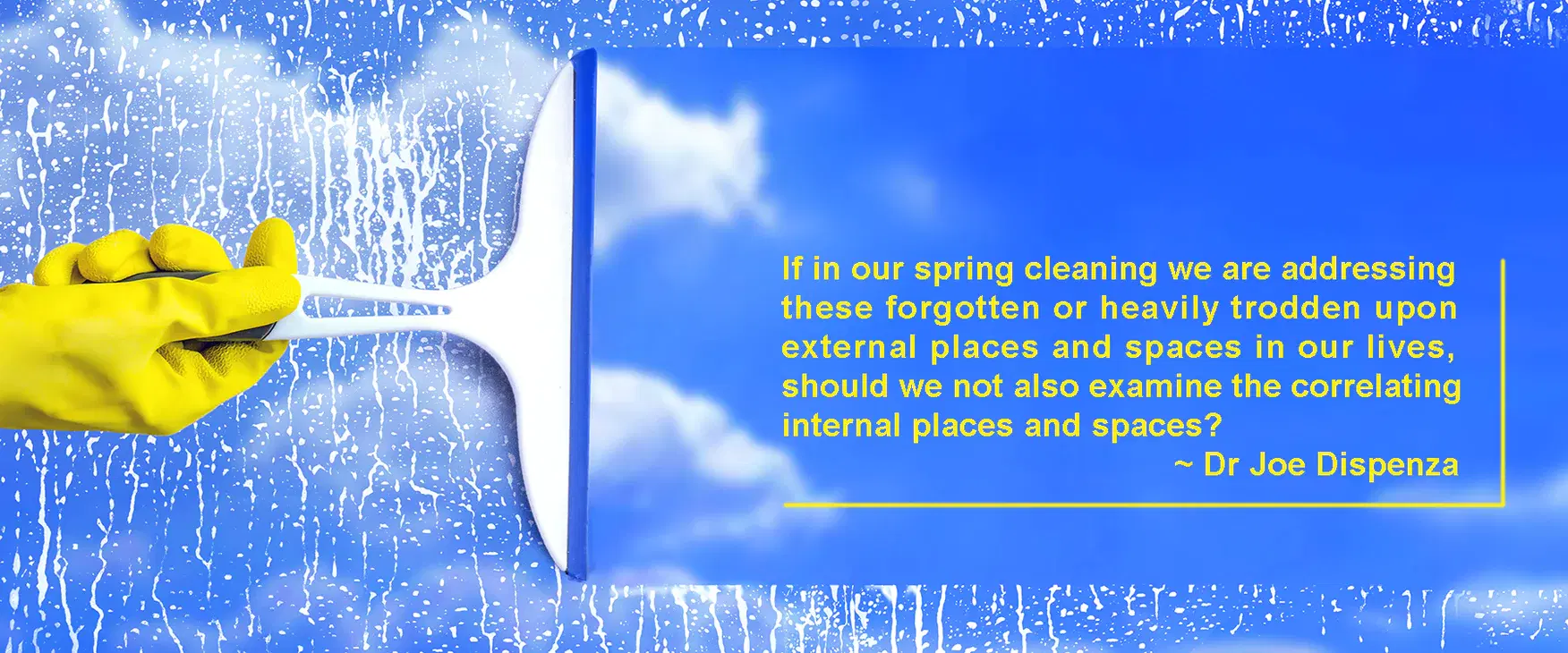Spring Cleaning the Old Self
Dr Joe Dispenza | 09 April 2021
When you hear the term spring cleaning, chances are that it might bring up images of going through old dresser drawers, putting away seasonal clothes, cleaning out the closets, or removing the science projects growing in the back of the refrigerator. Or maybe it’s getting organized in the garage, cleaning the hard-to-reach spaces behind furniture, sweeping underneath rugs, preparing your garden beds for the summer’s bounty, or removing the yard debris from winter’s wake. It would be fair to say then that we are bringing light, cleanliness, and newness to the unnoticed, forgotten, familiar, overlooked, or routine places and spaces of our homes and yards.
Now for a moment, let’s suppose the external world of reality is a mirror of our internal world—this is, after all, what the legendary Hellenistic figure Hermes Trismegistus meant when he said, “As above, so below, as within, so without, as the universe, so the soul…” Thus, if in our spring cleaning we are addressing these forgotten or heavily treaded-upon external places and spaces in our lives, should we not also examine the correlating internal places and spaces? At its core, this is the basic model of change I teach in the book, Breaking the Habit of Being Yourself.
What all of this comes down to is that, if we are talking about creating a new self, we can’t become the new self without cleaning out the old self. Said another way, you can’t reinvent a new self without breaking the habit of being your old self.
To fully leave the old self behind requires more than paying lip service to the desire to do so or simply “giving it a shot.” To become someone new requires contemplation, self-reflection, action and real substantive conscious work. What that means is that you have to get into the operating system where the subconscious or unconscious programs that rule your life exist—programs that keep you living in the illusion of this three-dimensional reality. Like concrete slowly setting over time, those programs (the totality of which form the old self) become solidified, thus creating your way of being, thinking, acting, and reacting in the world.
To extricate these programs from your life, you must become so conscious of and familiar with your unconscious thoughts, behaviors, and emotions that they never get past your conscious awareness unnoticed. This process of disentangling them from the old you is the work. That’s the spring cleaning right there.
When done successfully, you cease biologically firing and wiring certain self-limiting thoughts—which lead to certain self-limiting choices, which in turn lead to self-limiting behaviors, which lead to certain self-limiting experiences, which create certain self-limiting emotions. This is why the biological death of the old self is so fundamentally important to creating the new self—because the brain and body live in either the familiar past or the predictable future.
One of the greatest impediments to creating change is how many times a person unconsciously remembers their past throughout the day. Obviously, that thought of the past produces a feeling of the past, and it’s those thoughts and feelings that keep you in the past. The question that remains then is: How many times will it take you to remember a future that's greater than the habitual thoughts of your past that you produce throughout your day? If you’re only remembering your future for 20-30 minutes in your morning and evening meditations, but you spend the majority of your day remembering your past, you’re back in the predictable future and back to being your old self...and nothing changes in your life because you haven’t changed.
The purpose of this work is to literally disrupt and change those patterns and habituations that keep you from moving forward in your life or becoming the YOU you’ve always imagined. If you want to become someone new, it's paramount to really unlearn who you are—to unfire and unwire the old before you fire and wire the new; to deprogram the past before you reprogram the future.
I always say that you have to, in a sense, lose your mind to create a new one. This requires you to unmemorize the feelings and emotions in your body before you condition your body to a new mind and new emotions—and that requires you to step out of the known familiar past and predictable future and into the present moment. Why? Because only when you are in the present moment are you in the unknown, and only in the unkown can you create something new. Becoming comfortable in the unknown is mastering the moment. Just remember: The unknown will never let you down.

Comments